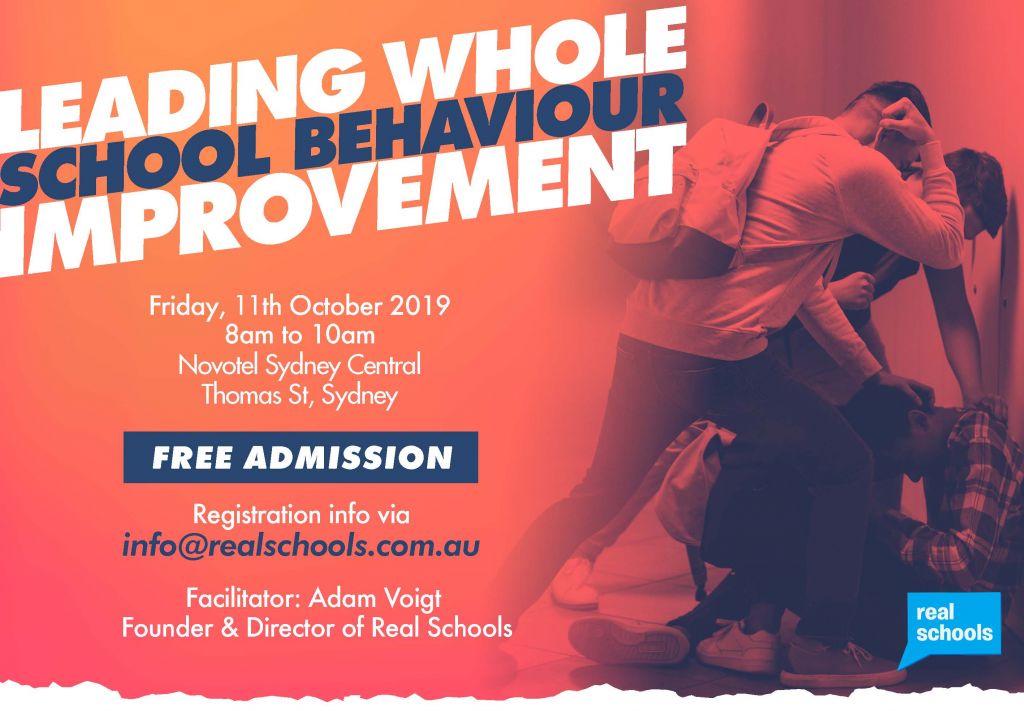Would you continue to use a Phillips head screwdriver on a standard screw if it didn’t get the job done? You wouldn’t would you? You’d change tools. Right?
So, when exactly do we start questioning our obsession with Behaviour Management programs?
Countless times now, we in schools, have spent enormous tracts of time and buckets of money on programs that were supposed to improve the way treat each other.
We got a lot done while these programs, most in recent times fiercely wed to the word “positive”, were being given their chance at change. We wrote new policies, we taught mini-lessons, we assigned new values, we built behaviour matrices and established tables for consistency of consequence for various levels (whatever they might actually be) of student mischief.
And still, on the other side of all this work, the transformation we hoped for in the way people really conduct themselves hasn’t happened.
Are these myriad of programs that poorly designed? I’d contend not. As far as programs go, they really are quite comprehensive.
Could it then be that programs alone don’t change the way people conduct themselves? Now we might be onto something.
Your school’s culture, it’s very context, drives the way people behave to a level that no program can substitute for. But working on culture is hard and sounds time consuming. And so we defer to the easier path of program implementation.
You’re time and your budget are being wasted with this thinking. It’s got to stop.
In much the same way that a we all adjust our behaviour when we land at a barbecue, when we attend a place of worship, when we sit in a cinema or when we hit a dancefloor – it’s the context of our behaviour that makes the difference.
You don’t need another positive program. You don’t need to sacrifice the sugar-hit of program implementation for the genuine feeling of progress that comes when people actually conduct themselves differently.
You just need to decide what behaviours you want normalised and then build a culture, or context, where those behaviours are most likely.
Countless times now, we in schools, have spent enormous tracts of time and buckets of money on programs that were supposed to improve the way treat each other.
We got a lot done while these programs, most in recent times fiercely wed to the word “positive”, were being given their chance at change. We wrote new policies, we taught mini-lessons, we assigned new values, we built behaviour matrices and established tables for consistency of consequence for various levels (whatever they might actually be) of student mischief.
And still, on the other side of all this work, the transformation we hoped for in the way people really conduct themselves hasn’t happened.
Are these myriad of programs that poorly designed? I’d contend not. As far as programs go, they really are quite comprehensive.
Could it then be that programs alone don’t change the way people conduct themselves? Now we might be onto something.
Your school’s culture, it’s very context, drives the way people behave to a level that no program can substitute for. But working on culture is hard and sounds time consuming. And so we defer to the easier path of program implementation.
You’re time and your budget are being wasted with this thinking. It’s got to stop.
In much the same way that a we all adjust our behaviour when we land at a barbecue, when we attend a place of worship, when we sit in a cinema or when we hit a dancefloor – it’s the context of our behaviour that makes the difference.
You don’t need another positive program. You don’t need to sacrifice the sugar-hit of program implementation for the genuine feeling of progress that comes when people actually conduct themselves differently.
You just need to decide what behaviours you want normalised and then build a culture, or context, where those behaviours are most likely.

LEADING WHOLE SCHOOL BEHAVIOUR IMPROVEMENT
A FREE 2-hour event for School Leaders who are frustrated by the failure of popular and poorly designed programs to genuinely improve conduct between students, staff and parents.
REAL SCHOOLS PARTNERSHIP
Working with your school over 12, 24 or 36 months to truly transform School Culture.